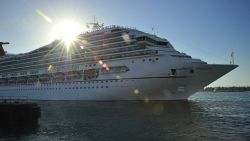Cruise giant Carnival was hit hard during the worst of the pandemic. Now, a top Wall Street analyst has issued a dire potential outlook for the company in the case of recession.
Morgan Stanley’s Jamie Rollo outlined a worse-case scenario: Carnival stock could fall to $0 in the event of a global economic downturn.
“If there is a demand shock that causes trip cancellations or weak bookings … liquidity could quickly shrink,” Rollo wrote in a report Wednesday. Carnival was not immediately available for comment.
In that bleak assessment, Rollo assumed that revenue would fall about 5% from pre-pandemic levels and that Carnival would need to raise more capital to bring down its debt levels, which “could become very challenging,” he said.
Shares of Carnival (CCL) plunged more than 15% Wednesday after Rollo’s report, and rivals Royal Caribbean (RCL) and Norwegian (NCLH) each fell more than 10% as well.
Carnival stock is not far from a 52-week low, after plummeting from $50 a share pre-pandemic to about $8.70 currently. That’s still above Rollo’s new base-case target price of $7, which assumes that revenue and capacity increase from 2019 levels.
The company released its second-quarter financial results last week, which included a loss of $1.8 billion. But sales rose 50% compared to the prior quarter, and the company also stressed that it has ample cash on hand with $7.5 billion of liquidity on its balance sheet.
“While not recession-proof, our business has proven to be recession-resilient time and again,” CEO Arnold Donald said during the company’s earnings call.
“As we have seen in prior cycles, even in downturns, employed people take vacations. And that’s even more true in today’s environment where people prioritize spending on experiences over spending on things,” Donald added, adding that “there is pent-up demand for travel globally which is a powerful tailwind.”
David Bernstein, Carnival’s chief financial officer, added during the call that “not every recession is the same.”
“We are currently in a very strong labor market. And given that, if people have jobs and they feel comfortable in their jobs, they’re likely to need a vacation” Bernstein said. “And remember, vacations are no longer a luxury, they’re a necessity in today’s world.”

























